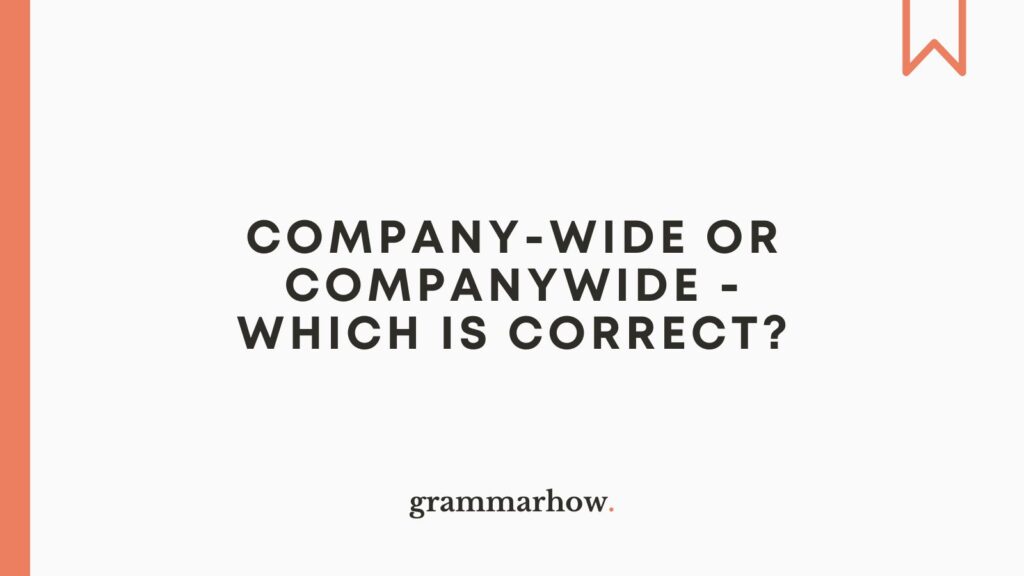So, you want to know more about the hyphen rule surrounding “company-wide.” Well, you’re in the right place.
This article will explain everything you need to know before using hyphens appropriately.
Company-wide or Companywide?
“Company-wide” and “companywide” are correct and interchangeable. They show what happens across a company. You can say “a companywide procedure” or “a companywide event.” The hyphen is not necessary to include, though it does make the adjective look more professional.
KEY TAKEAWAYS
- “Company-wide” and “companywide” are interchangeable adjectives.
- Generally, “company-wide” is more acceptable as it looks more official.
- “Company wide” should never be split into two words, as it is incorrect with a space between them.
Here are a few examples that might make things clearer for you:
- I’m going to need the company-wide event plan on my desk by Monday.
- It’s a companywide meeting. So, we expect you all to turn up and help out.
Keep reading to learn more about the hyphen rules for “company-wide.” We’ve explained the hyphenated variation and split it into one or two words to see which is most appropriate.
Is “Company-wide” Hyphenated?
“Company-wide” is hyphenated as a compound adjective. You should keep the hyphen when “company-wide” comes before a noun.
The hyphenation shows the modification of a noun. According to AP Style, hyphens are linkers that connect multiple words when they appear before a noun.
So, you would say:
- A company-wide event.
“Event” is the modified noun. The hyphen helps to illustrate the modification to the reader.
Here are a few examples showing you how it works:
- It will be a company-wide meeting. We expect all of you to come along to see what’s happening.
- She knew about the company-wide strategic planning but did nothing to change the ideas.
The hyphenated form looks more official. So, most readers will prefer it when they see it in formal writing.
Interestingly, the same rules apply to “firm-wide.” For instance:
- This is a firm-wide meeting. We cannot let you cancel it.
Is “Companywide” One Word?
“Companywide” is correct as one word when it’s a compound adjective. It’s synonymous with “company-wide,” meaning you can choose between the two forms.
AP Style allows you to drop hyphens from common compound adjectives when the distinction between the words is clear. Since “company” and “wide” are distinctly different, you can remove the hyphen and still show the reader what you mean.
Here are a few examples showing you how it might work:
- The companywide protocols have to change. There’s no way we can keep going like this.
- It’s happening companywide, and we need to fix it. Why have we not addressed this sooner?
Of course, the one-word variation is not as official as the hyphenated form. It’s better in informal situations when you prefer the one-word style.
Again, the same rules apply to “firmwide.” You can drop the hyphen and still use it as a compound adjective. For example:
- The firmwide emails are ready to go.
Is “Company wide” Two Words?
You should not use “company wide” as two words. It is incorrect because it does not allow you to modify a noun.
Removing the hyphen removes the modification. Instead, “company” modifies “wide,” which makes little sense in the context of any sentence.
Here are a few examples showing you how to use it correctly:
- Correct: I don’t appreciate you doing company-wide audits without my approval, Jack.
- Incorrect: It’s a company wide issue. We’re still trying to figure out what to do to correct it.
So, you should decide between the two correct variations. The two-word form is never correct.
Conclusion
“Company-wide” and “companywide” are synonyms. Both are correct as compound adjectives.
You should use “company-wide” in formal writing as it looks more official.
“Company wide” is never correct as two words. Unfortunately, it does not work as a compound adjective, so you should avoid it.

Martin holds a Master’s degree in Finance and International Business. He has six years of experience in professional communication with clients, executives, and colleagues. Furthermore, he has teaching experience from Aarhus University. Martin has been featured as an expert in communication and teaching on Forbes and Shopify. Read more about Martin here.

